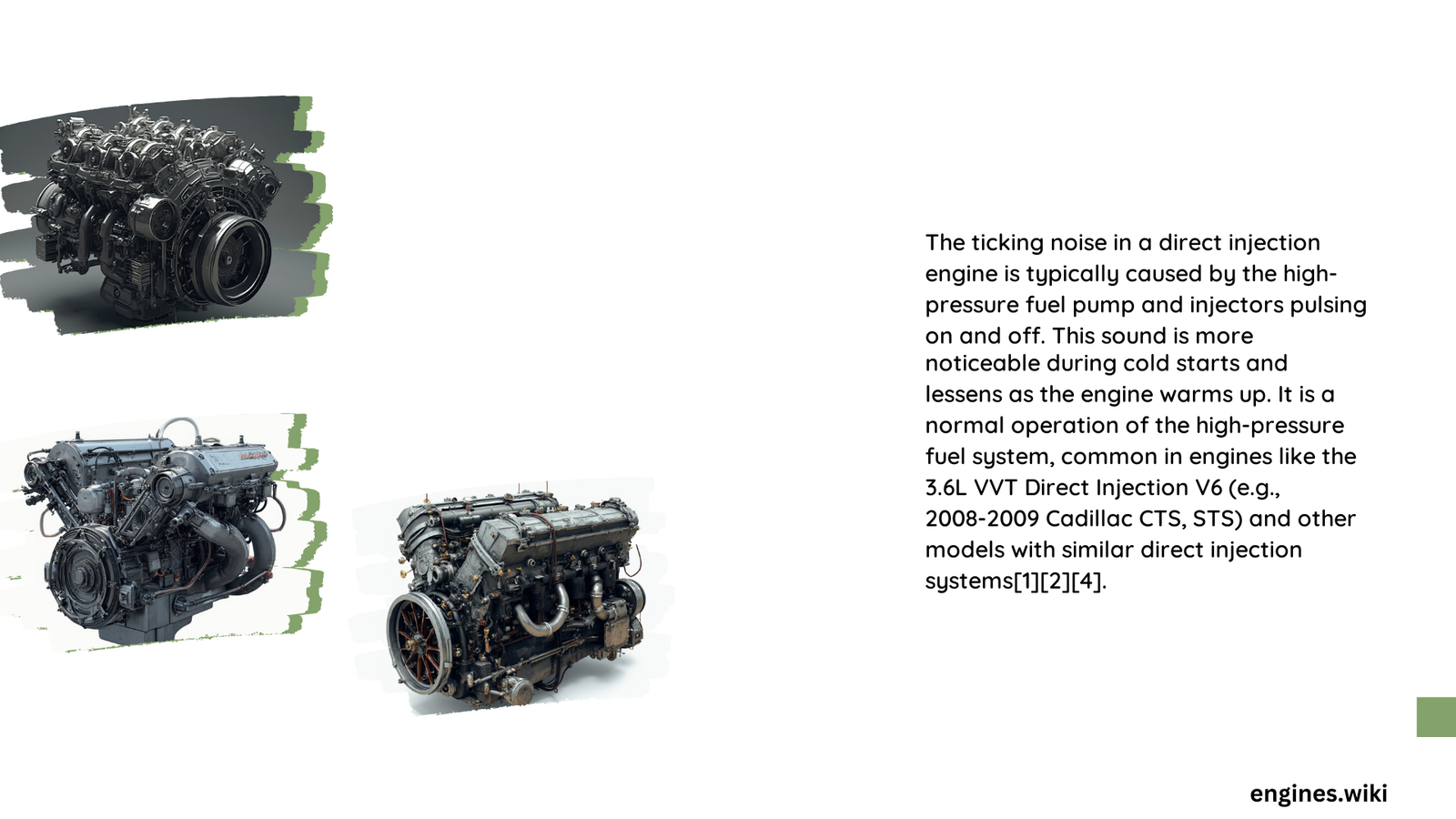Direct injection engine tick is a common phenomenon in modern vehicles equipped with direct fuel injection systems. This rapid clicking or ticking sound is often more noticeable during cold starts and at idle. While it can be concerning for some drivers, it’s typically a normal characteristic of these advanced engines. The noise is primarily caused by the high-pressure fuel pump and injectors operating at elevated pressures to deliver fuel directly into the combustion chamber.
What Causes Direct Injection Engine Tick?
The primary causes of direct injection engine tick are related to the normal operation of the fuel system components. Here’s a breakdown of the specific factors:
-
High-Pressure Fuel Pump: This component is responsible for building up the high fuel pressure required for direct injection. It can produce a rapid clicking or ticking sound, especially during cold start-up.
-
Fuel Injectors: Operating at high pressures, these injectors pulse on and off rapidly, creating a ticking sound. This noise is more pronounced during idle and cold start-up.
-
Engine Temperature: The ticking noise is typically louder and more frequent when the engine is cold, diminishing as it warms up.
-
Injector Design: The inherent design of direct injection fuel injectors contributes to the ticking sound due to their high-pressure operation.
It’s important to note that while poor fuel quality doesn’t directly cause the tick, it can lead to issues such as dirty or clogged injectors, which might exacerbate similar noises.
What Are the Symptoms of Direct Injection Engine Tick?

Understanding the symptoms associated with direct injection engine tick can help differentiate between normal operation and potential issues:
- Sound Characteristics:
- Rapid clicking or ticking noise
- More audible during idle and cold start-up
-
Lessens as the engine warms up and reaches higher RPMs
-
Engine Performance:
- Typically, no adverse effects on performance
-
If accompanied by reduced power, poor fuel efficiency, or rough idling, it may indicate other underlying problems
-
Frequency and Timing:
- Most noticeable at idle and low engine speeds
- Becomes less frequent and quieter as the engine warms up
How to Fix Direct Injection Engine Tick?
Addressing direct injection engine tick depends on whether it’s due to normal operation or actual issues:
Normal Operation
If the ticking noise is caused by the standard functioning of the high-pressure fuel pump and injectors, no repair is necessary. It’s crucial to inform vehicle owners that this sound is a characteristic of direct injection engines and not indicative of a problem.
Actual Issues
If the ticking noise is exacerbated by other factors, consider the following solutions:
- Clean or Replace Fuel Injectors:
- Estimated Cost: $100 to $500
- Time Required: Few hours for cleaning, several hours for replacement
-
Benefits: Improved fuel efficiency and engine performance
-
Use High-Quality Fuel:
-
While not directly related to the tick, using premium fuel can help maintain clean injectors and optimal engine performance.
-
Regular Maintenance:
- Follow the manufacturer’s recommended maintenance schedule to ensure all engine components are functioning correctly.
Does Direct Injection Engine Tick Affect Vehicle Performance?
Understanding the impact of direct injection engine tick on vehicle performance is crucial for both drivers and mechanics:
Long-term Effects
- Engine Longevity: The normal ticking noise from direct injection systems doesn’t adversely affect engine longevity.
- Fuel Efficiency: Standard ticking doesn’t impact fuel efficiency. However, if caused by dirty injectors, addressing the issue can improve efficiency.
- Emissions: No direct correlation between normal ticking and increased emissions. However, underlying issues causing the noise might affect emissions if left unaddressed.
Diagnostic Considerations
- Diagnostic Trouble Codes (DTCs): Normal ticking doesn’t trigger DTCs. If accompanied by other symptoms, it may lead to fuel system or engine performance-related codes.
- Professional Diagnosis: If the ticking is accompanied by performance issues or seems unusually loud, a professional diagnosis is recommended.
Frequently Asked Questions About Direct Injection Engine Tick
Is Direct Injection Engine Tick Normal?
Yes, a certain level of ticking noise is normal for direct injection engines. It’s caused by the high-pressure fuel system components and is more noticeable during cold starts and at idle.
Can I Prevent Direct Injection Engine Tick?
While you can’t prevent the normal ticking associated with direct injection engines, you can minimize potential issues by:
- Using high-quality fuel
- Following regular maintenance schedules
- Addressing any performance issues promptly
When Should I Be Concerned About Engine Ticking?
Be concerned if the ticking noise:
- Becomes significantly louder or changes in character
- Is accompanied by performance issues like reduced power or poor fuel economy
- Persists even after the engine is fully warmed up
In these cases, it’s best to have your vehicle inspected by a qualified mechanic.
Conclusion
Direct injection engine tick is a common characteristic of modern engines equipped with this advanced fuel delivery system. While it can be concerning for some drivers, it’s typically not a sign of a problem. Understanding the causes, symptoms, and potential fixes can help vehicle owners distinguish between normal operation and issues that require attention. Regular maintenance and using quality fuel can help ensure optimal performance and longevity of direct injection engines.
